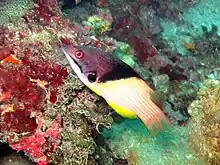Bodianus mesothorax
Bodianus mesothorax, the split-level hogfish, blackbelt hogfish, black-belt hogfish, coral hogfish, eclipse hogfish, eclipse pigfish, mesothorax hogfish or yellow-spotted hogfish,[3] is a species of wrasse native to the western Pacific Ocean and the eastern Indian Ocean.
| Bodianus mesothorax | |
|---|---|
 | |
| Specimen from the northeast coast, Taiwan | |
| Scientific classification | |
| Domain: | Eukaryota |
| Kingdom: | Animalia |
| Phylum: | Chordata |
| Class: | Actinopterygii |
| Order: | Labriformes |
| Family: | Labridae |
| Genus: | Bodianus |
| Species: | B. mesothorax |
| Binomial name | |
| Bodianus mesothorax (Bloch & J. G. Schneider, 1801) | |
| Synonyms[2] | |
| |
Description
Bodianus mesothoraxwhich has a distinct blackish diagonal band between the purplish head end of the body and the whitish to yellowish posterior part. The juveniles are dark purple with two lines of bright yellow spots. They are similar to the juveniles of the axilspot hogfish (Bodianus axillaris) although these have white rather than yellow spots.[3] This species can reach a length of 25 cm (9.8 in). The body pattern and colouration of juveniles changes to the adult pattern when they attain a length of 5–6 centimetres (2.0–2.4 in). They take only a few weeks to change completely and intermediate fish are very rarely recorded.[2] The adults are distinguished from the adults of the axilspot hogfish by the dark diagonal band and the lack of spots on the dorsal fin and the anal fin.[3]
Distribution
Bodianus mesothorax is found in the eastern Indian Ocean as far west as the Nicobar Islands in the Andaman Sea and in the western Pacific Ocean from Japan I the north and Australia in the south as far east as Fiji.[2]
Habitat and biology
Bodianus mesothorax can be found on reefs at depths of 5 to 40 m (16 to 131 ft), though rarely below 20 m (66 ft). Juveniles inhabit caves in the reef. Adults of this species clean other fish by eating parasites on the body of other reef fish.[2]
In the aquarium
This species can be found in the aquarium trade.[2] It is commonly imported for the fish trade from the Philippines and Indonesia.[4]
References
- Russell, B. (2010). "Bodianus mesothorax". IUCN Red List of Threatened Species. 2010: e.T187646A8589079. doi:10.2305/IUCN.UK.2010-4.RLTS.T187646A8589079.en. Retrieved 12 November 2021.
- Froese, Rainer; Pauly, Daniel (eds.) (2019). "Bodianus mesothorax" in FishBase. August 2019 version.
- Dianne J. Bray. "Bodianus mesothorax". Fishes of Australia. Museums Victoria. Retrieved 28 December 2019.
- Tristan Lougher (2006). What Fish?: A Buyer's Guide to Marine Fish. Interpet Publishing. ISBN 978-1-84286-118-9.
External links
- Photos of Bodianus mesothorax on Sealife Collection
